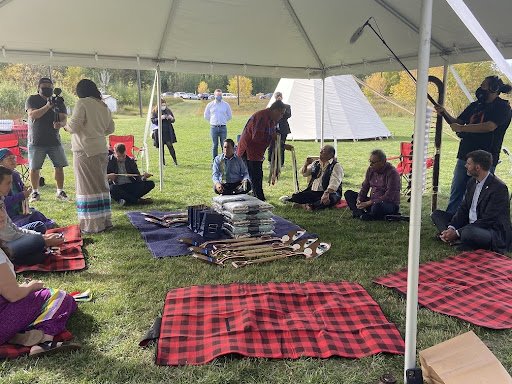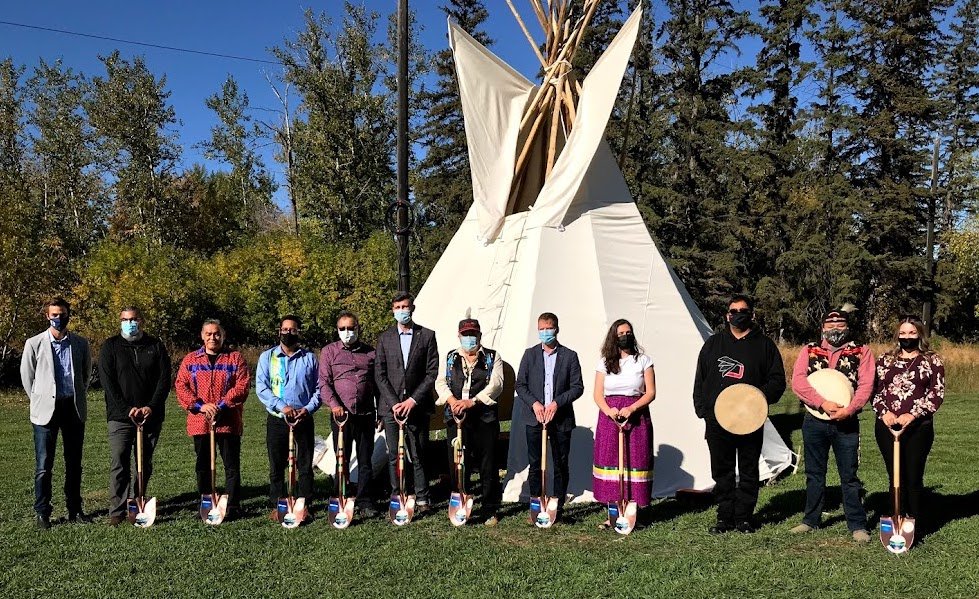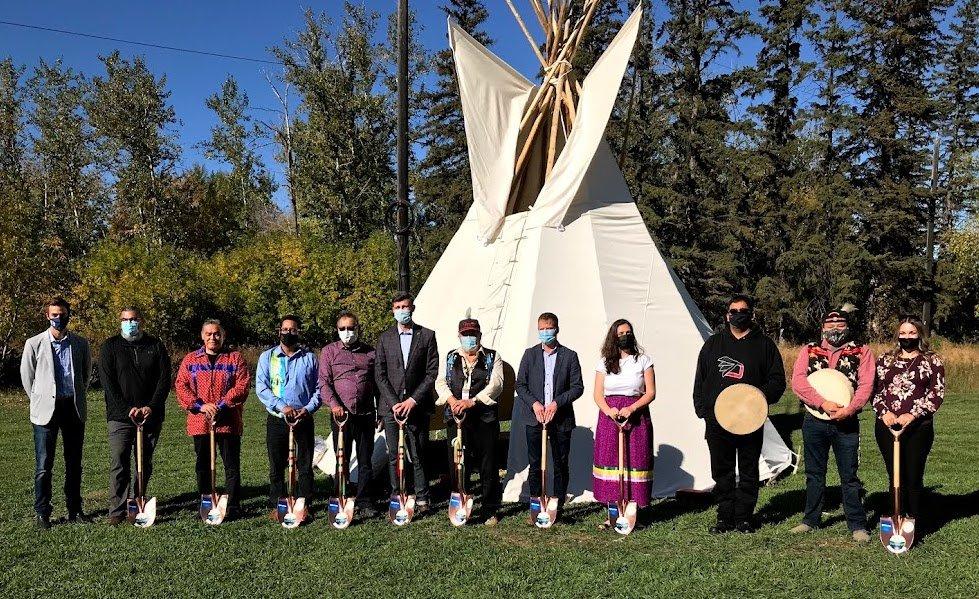Edmonton's Whitemud Park will soon be home to a cherished spot for the city's Indigenous community – a ceremonial site called kihciy askiy, meaning “Sacred Land” in Cree. Expected to take up to two years to complete, the site will host sacred events. According to the project's manager, Lewis Cardinal, the project has been 15 years in the making and will be the first urban Indigenous ceremonial grounds in Canada. This will give Indigenous peoples a permanent space to be able to do ceremonies right in Edmonton's city limits for the very first time.

KIHCIY ASKIY PROJECT BLESSING: PHOTOS FROM THE INDIGENOUS KNOWLEDGE AND WISDOM CENTRE
As significant as the spot will be once complete, the work to build it embodies a momentous shift in Edmonton's construction industry. Many members of the workforce will be Indigenous – as part of a push for social procurement.
This change is as a result of the City of Edmonton's Sustainable Procurement Policy passed by Council in 2019 which integrates economic, quality, environmental and social value considerations into procurement processes for goods, services and construction projects. The City of Edmonton is also exploring the development of an Indigenous procurement framework to further reconciliation, strengthen relationships and enable more Indigenous businesses to participate in City procurement opportunities. It is EndPoverty Edmonton's role to support the implementation of these social procurement policies.
“Our vision is to eliminate poverty in Edmonton in a generation,” said Susannah Cameron, with EndPovertyEdmonton. “One way of ending poverty is to create economic opportunities for those living in poverty.”
---
EndPovertyEdmonton is a regional partner of Buy Social Canada procurement initiative. Buy Social Canada describes social procurement in this way: “Every purchase has a social, economic, cultural, and environmental impact. Social procurement is about using your existing purchasing to capture those impacts to achieve overarching institutional, governmental, or individual goals that help shape inclusive, vibrant and healthy communities.”
In other words – spending your dollars in a way that benefits the most people who could use it the most.
When the City of Edmonton put out a Request for Proposal (RFP) to select a construction manager for the kihciy askiy project, it included an Indigenous procurement component.

KIHCIY ASKIY PROJECT BLESSING: PHOTOS FROM THE INDIGENOUS KNOWLEDGE AND WISDOM CENTRE
“This is not on every RFP,” said Jason Deboski, the corporate project development manager of Delnor Construction, whose company was selected as the project's construction manager. “But we are starting to see more of it, which I think is fantastic.
“When a government body is asking for things like that, these types of things begin to become more solid and more standard practice.”
In an industry facing a labour shortage, Deboski said turning to an underrepresented labour force and providing opportunities is important, whether it's new Canadians, women, people living on low incomes or members of the Indigenous community.
“The construction industry is a great place for anybody to start in whatever position and to have the opportunity to develop a meaningful career for themselves,” Deboski explained.
According to the City of Edmonton, 71 competitive procurements included social benefit criteria in 2021, representing about 43 per cent of posted competitions. With that number expected to rise, one big question exists: how deep is the workforce talent pool?
---
EndPovertyEdmonton is working to address that challenge by bringing workforce development organizations together to identify potential employees, provide training, connect them with employers, and address barriers that exist in the construction industry.
“The real obvious barriers include language and context,” said Andrea Streisel, the employment program lead with Action for Health Communities (AHC), which helps newcomers to Canada settle into their new life. “Even if someone worked in construction in their home country, they're going to have different materials, different workplace culture, different weather if working outside.”
Through past initiatives to get new Canadians into construction jobs, Streisel says she has an idea of what works and what doesn't. Exposing someone to the industry before providing full on skills training is important to determine if this is something they really want to do as a career. And for those who have previous experience in the industry, there needs to be a way to assess their skills rather than holding them up for months or a year with training.
Bredin Centre for Career Advancement is bringing its expertise in providing career development and job search support to the table. One of the challenges to address this, is to help employers who are committed to social procurement know where to start.
“If we can develop some kind of a ‘one-stop-shop' for employers, this could make it much easier for employers to put out their opportunities and to find the right fit quickly,” said Bredin's senior director Kathy Alves.
Alves is hearing from employers who first reach out to EndPoverty Edmonton to find underrepresented workers. The agencies and partners involved in this work recently met with stakeholders, including employers to discuss larger infrastructure projects in the city. They talked about acceptance, training and hiring practices, and how to make them more accessible for those facing barriers to employment.
Matt Schellenberger, director of corporate development with the Edmonton Construction Association, says while social procurement is fairly new in Edmonton, other municipalities like Vancouver have been doing it for years.
Some larger, local contractors have experience in other markets, but that doesn't necessarily translate into Edmonton where the social procurement frameworks aren't quite as advanced.
“We're in the middle space of trying to figure out how we can best support that transition over the next two, three, four, five years,” said Schellenberger. “It's clearly not going away, nor should it. I think the industry has come around and understood the value of what this is.”
There are also concerns that social procurement costs projects more, something Deboski at Delnor Construction disputes: “it's certainly not something that really has a significant cost component to it”, he says.
Cameron with EndPoverty Edmonton says it also benefits all of society.
“Social procurement can help underemployed workers get skills training and good jobs, help local businesses create jobs, diversify valuable supply chains, including social enterprises, cooperatives and diverse business owners and realize other community benefits,” she said.
In fact recently, the Alberta Government just announced a $1.53-million investment under the Workforce Partnerships program will support 16 projects in biotechnology, trucking, energy, aviation, forestry and retail that will focus on hiring more women, newcomers, Indigenous peoples, mature workers, youth and people living with a disability.
Erick Ambtman of EndPoverty Edmonton spoke with Global News about the announcement. You can watch that story here.
Brooks Hanewich with EndPoverty Edmonton says, “Given the current and future constraints on the Alberta economy and workforce, it is essential that we build a local, sustainable workforce ensuring that this rich, untapped labour force is engaged, trained, and welcomed into the workforce. We suggest that while these programs are administered and lessons are learned, they are paired with the vast expertise of workforce and employment organizations, as well as community organizations/groups, who know best the barriers that women, newcomers, Indigenous peoples, mature workers, youth, and people living with a disability face. Without their input and the structural barriers addressed, Alberta will continue to face labour shortages, and this vast labour pool will continue to remain untapped.”
All this work is in the early stages, but everyone involved – from EndPoverty Edmonton to workforce organizations and construction companies say it will have a lasting impact on the industry.
“I look forward to the day when it's standard practice,” said Deboski, “And it's just the way we do business.”

